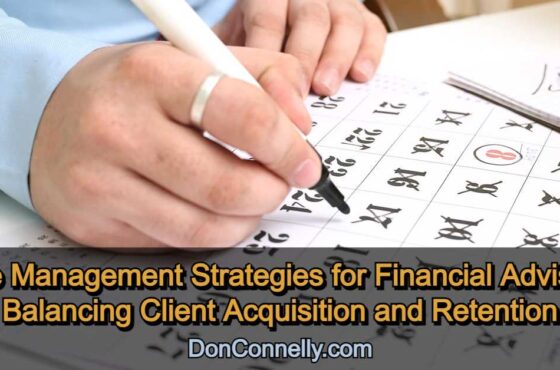5 Advantages Young Financial Advisors Have Over Older Advisors
 When it comes to asking people to handle their money, having a few grey hairs does bring a small advantage. People are just naturally reluctant to trust people with managing their money who are younger than their own children.
When it comes to asking people to handle their money, having a few grey hairs does bring a small advantage. People are just naturally reluctant to trust people with managing their money who are younger than their own children.
But there are some huge advantages to being a younger advisor, as well. In fact, I can tell you after decades in this business, there has never been a better time in the history of the financial services business to be coming into this business as a young advisor, or even a career changer under 40.
#1. Young Financial Advisors have the edge with younger clients.
Age bias works both ways. Sure, it’s tough to break into the senior market when you’re in your 20s, and every older person in your natural market has an advisor they’ve been working with since 1978.
But just as older people are reluctant to trust much younger people on money issues, older advisors have trouble reaching Millennial clients. There are plenty of young entrepreneurs, successful media personalities, doctors, lawyers, Internet business owners, tech stock option bonanza winners and millionaire YouTube stars out there younger than 35 who need help with their money.
Your older competition often has no idea how to reach these people or connect emotionally with them for that matter. But if you’ve been paying attention, you do.
Many planners make the critical mistake of neglecting or ignoring younger and smaller clients. In the long run, that is a business-killer.
#2. Young Financial Advisors have the edge in technology.
A generation ago, it was normal for people to buy life insurance and mutual funds from a sales agent at the kitchen table. Today that’s the exception rather than the rule: Most transactions happen over the Internet. And the fact is, many older advisors are completely lost when it comes to Internet marketing of financial services.
The financial services industry has changed radically just in the last few years. A generation ago, a new advisor could cold-call their way to success. Since the advent of the Do-Not-Call list, it’s very difficult to do so now. But as a young advisor, you may well have the inside track on something much more powerful: Inbound marketing.
In a nutshell, inbound marketing means the use of content and search engine optimization to attract readers and viewers to your website, establish yourself as a credible expert who can help them, and “convert” prospects into leads or clients by capturing their contact information, getting them to request an appointment, or purchase on the spot, on line.
With inbound marketing, your website can be working for you while you sleep. Do it well, and you can wake up each morning with a pile of fresh leads to work on – exclusive to you, and ready to hear from you!
It’s an amazing development. But a lot of older advisors are still stuck in the old ways of doing business. It does require a lot of work learning new concepts, developing content, etc. But if you master inbound marketing, you will have a huge and lasting advantage over your older and more hidebound, technology-challenged competition.
#3. Young Advisors have demographics on their side.
Many financial services firms have been setting up obstacles to bringing on young clients. They haven’t entered their peak earnings years yet. And so, they get frozen out by unrealistic and short-signed minimum asset levels.
But hold on to your hats: Millennials are set to inherit as much as $30 trillion from their Baby Boomer parents over the next 25-35 years in the U.S. alone. That’s the biggest intergenerational transfer of wealth in history.
When it happens, the old-school people who’ve been chasing the retiree set and ignoring younger prospects are going to be caught wrong-footed. Those assets will eventually be captured and under the management of today’s forward-thinking advisors working with today’s Millennials and Generation Ys, and building relationships with them based on trust and service.
Patient younger advisors building a client base of people around their own age will be rewarded.
#4. Young Financial Advisors know how to use media for marketing.
Younger people have a terrific advantage in the use of media in marketing financial services. This is not the same thing as having a technology advantage, though the two are closely related. Younger advisors are making terrific strides in reaching niche audiences and building markets through the creative use of social media, including Facebook, YouTube and Instagram.
While advisors a generation ago got to be good at talking on the phone, today’s younger advisors are mastering not just the financial services trade, but becoming adept at video production, video editing, content production, podcasting and internet conferencing. All much needed during this challenging time of social distancing and post-pandemic circumstances.
Over time, these advantages will become more and more important.
#5. Younger Advisors might have a more relevant financial planning approach.
Today’s Millennials aren’t satisfied with the service they’ve been getting from their older advisors, and they’re ready to bolt: 48% of emerging affluent Millennials who are working with financial advisors say they are planning to ditch their advisor over the next year. That’s six TIMES the dissatisfaction rate of older investors, according to a 2017 survey from J.D. Power.
When presenting solutions to younger prospects, older financial advisors often miss the mark. For example, they may be talking about preparing for homeownership, complete with the white picket fences – because that’s what they did. Meanwhile, the prospects are more interested in living a tech nomad, globetrotting lifestyle.
Older advisors may not be familiar with terms like PAYE, REPAYE and PSLF. But these terms from the federal student loan world are critically important for millions in their 20s and 30s.
Younger financial advisors who can help their clients solve student loan problems will be well positioned to help them when their student loans are paid off. Then they can maximize retirement account contributions, afford permanent life insurance, disability and long-term care, and begin inheriting their share of that $30 trillion from their parents and grandparents over the next two or three decades.
So sure, write that annuity business. Help people retire comfortably and securely as best you can. But don’t neglect those 20-something, 30-something and 40-something prospects. The seeds you plant in those markets will one day become mighty oak trees that will support your practice for decades to come.
If you’re just starting your practice as a Financial Advisor, watch this 4-minute video to learn how our video training program can help you beat the 80% failure rate in the business.
See details and enroll today for $149!
24 video lessons. 24 exercises. A survival’s manual. And an enormous head-start on your competition. Enroll now.



